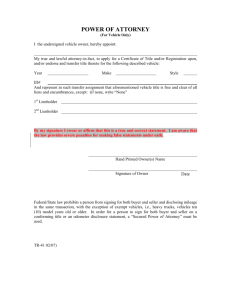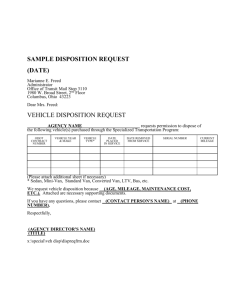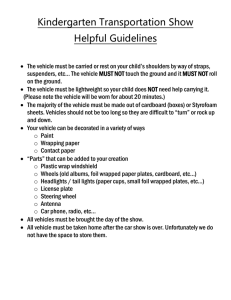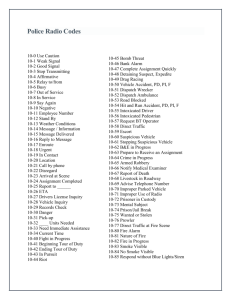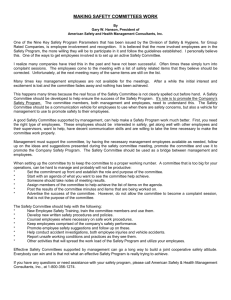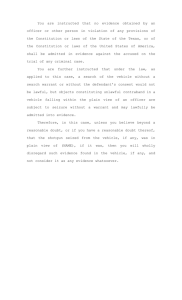(Vehicle) Personal Property Tax FAQs What is
advertisement
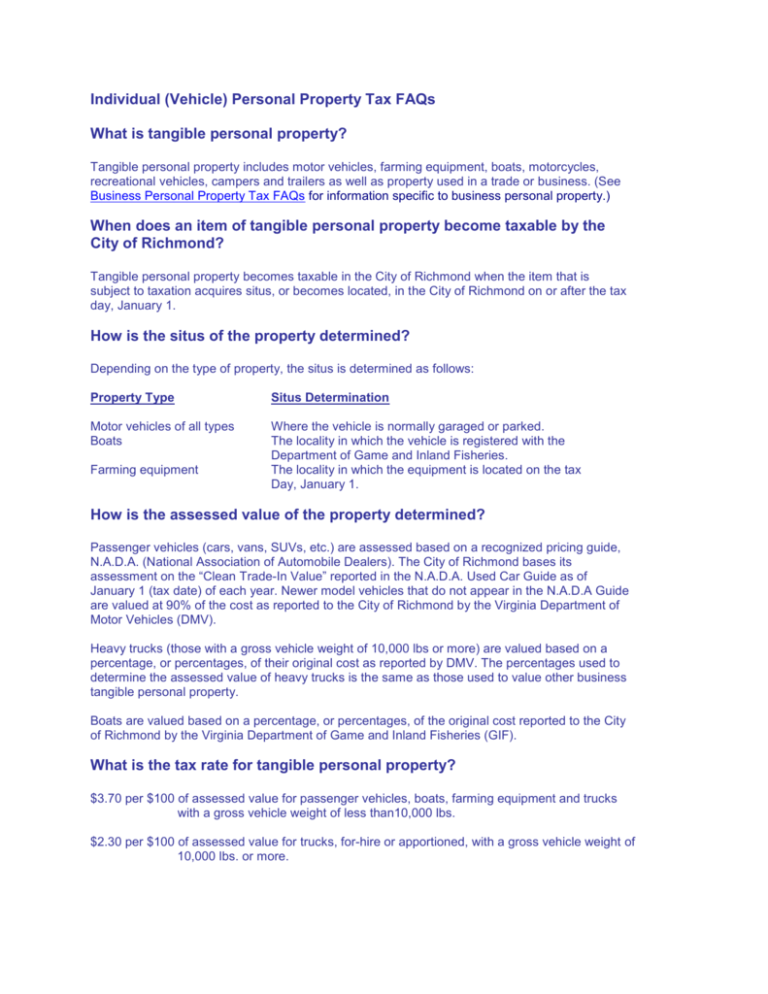
Individual (Vehicle) Personal Property Tax FAQs What is tangible personal property? Tangible personal property includes motor vehicles, farming equipment, boats, motorcycles, recreational vehicles, campers and trailers as well as property used in a trade or business. (See Business Personal Property Tax FAQs for information specific to business personal property.) When does an item of tangible personal property become taxable by the City of Richmond? Tangible personal property becomes taxable in the City of Richmond when the item that is subject to taxation acquires situs, or becomes located, in the City of Richmond on or after the tax day, January 1. How is the situs of the property determined? Depending on the type of property, the situs is determined as follows: Property Type Situs Determination Motor vehicles of all types Boats Where the vehicle is normally garaged or parked. The locality in which the vehicle is registered with the Department of Game and Inland Fisheries. The locality in which the equipment is located on the tax Day, January 1. Farming equipment How is the assessed value of the property determined? Passenger vehicles (cars, vans, SUVs, etc.) are assessed based on a recognized pricing guide, N.A.D.A. (National Association of Automobile Dealers). The City of Richmond bases its assessment on the “Clean Trade-In Value” reported in the N.A.D.A. Used Car Guide as of January 1 (tax date) of each year. Newer model vehicles that do not appear in the N.A.D.A Guide are valued at 90% of the cost as reported to the City of Richmond by the Virginia Department of Motor Vehicles (DMV). Heavy trucks (those with a gross vehicle weight of 10,000 lbs or more) are valued based on a percentage, or percentages, of their original cost as reported by DMV. The percentages used to determine the assessed value of heavy trucks is the same as those used to value other business tangible personal property. Boats are valued based on a percentage, or percentages, of the original cost reported to the City of Richmond by the Virginia Department of Game and Inland Fisheries (GIF). What is the tax rate for tangible personal property? $3.70 per $100 of assessed value for passenger vehicles, boats, farming equipment and trucks with a gross vehicle weight of less than10,000 lbs. $2.30 per $100 of assessed value for trucks, for-hire or apportioned, with a gross vehicle weight of 10,000 lbs. or more. What is the tax due date for payment of personal property taxes in Richmond? June 5 of each tax year or within 60 days of the date of purchase, whichever is later. For example, a vehicle purchased on February 1 would be included in the City’s annual billing for property taxes due on June 5. However, property taxes on a vehicle purchased, or moved into Richmond after March 1, would be due 60 days from the date of purchase or the date the vehicle acquires situs in the City of Richmond. In this example, if the vehicle were purchased on March 15, the property tax due date for the taxes on this vehicle would be June 5. Does the City of Richmond prorate personal property taxes? Yes, with the exception of property taxes on boats. Boats are taxed based on where they are located on January 1. The property taxes on motor vehicles and trailers are prorated based on the date of purchase or the date the vehicle acquires taxable situs in the City of Richmond on an even month basis. If a vehicle is purchased before the 15th of the month, that entire month counts in the proration of the vehicle for tax purposes. If the vehicle is purchased after the 15th of the month, that month does not count in the proration of the taxes. For example: A vehicle is purchased on March 12 th. For property tax purposes the vehicle is taxed for 10 months (March – December) of the tax year. A vehicle purchased on March 16 would be taxed for 9 months (April – December) with the month of March not counting in the proration of the taxes. I moved from a non-prorating locality to the City of Richmond after January 1. How is my vehicle taxed by the City of Richmond? Since you moved from a non-prorating locality to the City of Richmond after January 1, the locality from which you moved will tax your vehicle for the entire tax year. Depending on the particular facts and circumstances concerning your vehicle and whether you have been assessed and paid taxes to the locality from which you moved, the City of Richmond may assess your vehicle for property taxes as well and give you a credit for taxes paid to another Virginia locality. To enable our staff to review the particulars regarding you and your vehicle(s), please contact one of our Tax Representatives at 804-646-7000. I moved from the City of Richmond to a non-prorating locality after January 1. Why is my vehicle still being taxed by the City of Richmond? Pursuant to Virginia law, §58.1-3516, “No refund shall be made if the motor vehicle, trailer, semitrailer, or boat acquires a situs within the Commonwealth in a non-prorating locality.” Since the taxable situs of the vehicle on January 1 was the City of Richmond, the vehicle is subject to personal property taxes in the City of Richmond. The non-prorating locality will not assess the vehicle for property taxes until the next tax year; therefore, the vehicle is subject to personal property taxes until it acquires taxable situs in another Virginia taxing jurisdiction. I’ve heard something about a “Personal Property Tax Relief Act”. What is it and how does it affect the tax amount due on my vehicle? The Personal Property Tax Relief Act (PPTRA) was first adopted by the Virginia General Assembly in 1998 and subsequently amended in 2005. In short, the PPTRA provides tax relief to owners of personal use vehicles based on the assessed value of the vehicle. The owners of vehicles that qualify for property tax relief (PPTR) receive a full or partial exemption on the first $20,000 of assessed value of the vehicle. Qualifying vehicles with an assessed value of $1,000 or less receive a full exemption from the personal property tax. Qualifying vehicles with an assessed value greater than $1,000 receive a partial exemption on the first $20,000 of assessed value. The amount, or percentage, of the partial exemption is authorized each tax year by Richmond City Council. In 2013, for example, the partial exemption for qualifying vehicles was 58% of the tax on the first $20,000 of assessed value. Below is a table that illustrates how the PPTRA would apply to vehicles of varying assessed values based on the 2013 PPTR of 58%. Vehicle Use Assessed Value Tax Amount Tax Exemption Tax Balance Due Vehicle Use Business Use Personal Use Assessed Value $20,000 $ 1,000 $10,000 $25,000 Total Tax Amount $740.00 $ 37.00 $370.00 $925.00 Tax Exemption None $37.00 $214.60 $429.20 Tax Balance Due $740.00 $ 0.00 $155.40 $495.80 What vehicles are not eligible for property tax relief? Vehicles that are used predominantly, e.g. more than 50%, for business purposes, vehicles for which depreciation and other expenses have been claimed on the federal income tax return of a business or individual, vehicles with a gross vehicle weight of more than 7,500 lbs. and personal use trailers that are used to transport boats, etc. If any of the following questions can be answered yes, the motor vehicle is considered to be used for business purposes under Virginia law and not eligible for property tax relief: (1) Is more than 50% of the mileage for the year used as a business expense for Federal Income Tax purposes or reimbursed by an employer? (2) Is more than 50% of the depreciation associated with the vehicle deducted as a business expense for Federal Income Tax purposes? (3) Is the cost of the vehicle expensed pursuant to Section 179 of the Internal Revenue Service Code? (4) Is the vehicle leased by an individual and the leasing company pays the tax without reimbursement from the individual? My son (or daughter) is attending college and living in the City of Richmond. I own the vehicle they are driving. The vehicle is registered in my name and I do not live in the City of Richmond. How is this vehicle treated for tax purposes by the City of Richmond? The general rule, under current Virginia law, §58.1-3511 of the Virginia Code, provides the situs for property taxation is where the vehicle is normally garaged, docked or parked. The following exception is stated in §58.1-3511 regarding the motor vehicles of full-time students attending an institution of higher education: “However, in the event that a motor vehicle is used by a full-time student attending an institution of higher education, and such use establishes that the motor vehicle is normally garaged at the location of the institution of higher education, the situs shall be the domicile of the owner of the motor vehicle, provided the owner presents sufficient evidence that he has paid a personal property tax on the motor vehicle in his domicile, upon request of the locality of the institution of higher education.” As in your question you have stated that you are the registered owner of the vehicle driven by your son, or daughter, who is living and attending college in Richmond, the exception provided in Virginia Code §58.1-3511 may be applicable. Therefore, the situs for property taxation, upon providing sufficient evidence that you have paid a personal property tax where you are domiciled would be applicable. There are other factors that often must be considered in such situations. For example, many students reside in areas that require a Residential Restricted Parking Permit. To ensure that your vehicle is recorded on the tax records of the appropriate locality, please contact one of our Tax Representatives so they can discuss the facts and circumstances particular to your, and your son or daughter’s, situation with you, at 804-646-7000. I have recently moved from the City of Richmond to another locality in Virginia. When I attempted to register my vehicle with DMV at my new address, I was told there was a “hold” on my vehicle registration that had been placed by the City of Richmond. Can you explain what this is about? In recent years, the City of Richmond and many other localities in Virginia, have entered into agreements with DMV regarding vehicle registrations. The DMV program is known as the Vehicle Registration Withholding Program, or VRW. As a participant in the VRW program, the City of Richmond reports outstanding personal property taxes to DMV. DMV agrees to withhold the vehicle registrations of those who are reported to them as having unpaid property taxes to the City of Richmond. To receive information specific to your situation and resolve the vehicle registration issue, please contact one of our delinquent collection personnel at 804-646-7000. Can the assessment of my vehicle be adjusted due to high mileage or condition of the vehicle? You may submit a form to the Department of Finance to have the mileage or condition of your vehicle evaluated. Click here to obtain a copy of the form regarding high mileage and here to obtain a copy of the form regarding the condition of your vehicle. Important note: The mileage or condition information must be the mileage or condition of the vehicle on the tax date, January 1.Upon receipt of either of these forms, Revenue Administration personnel will review the information on the form and notify you of our decision regarding the value of your vehicle. In high mileage situations, we use the information provided by N.A.D.A. to (1) determine if the vehicle qualifies as a high-mileage vehicle and (2) what to deduct from the assessment based on the mileage.


